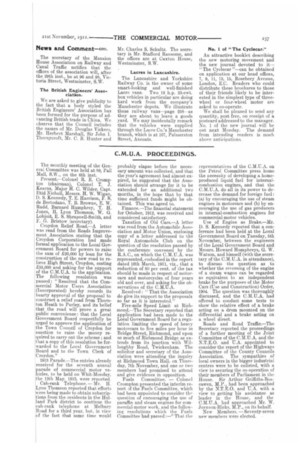C.M.U.A. PROCEEDINGS.
Page 13

If you've noticed an error in this article please click here to report it so we can fix it.
The monthly meeting of the General Committee was held at 89, Pall Mall, S.W., on the 6th inst. Present.—Colonel R. E. Crompton (chairman), Colonel T. J. Kearns, Major H. C. Wilder, Capt. Iltid Nichol', Messrs. H. W, Wigan, D. S. Kennedy, T. E. Harrison, F. R, de Bertodano, T. B. Browne, E. W. Rudd, Barnard Humphrey, T. H. Jones, H. Lyon Thomson, W. G. Lobjoit, E. S. Shrapnell-Smith, and F. G. Bristow (secretary). Croydon Relief Road.—A letter was read from the Roads Improvement Association stating that the Croydon Corporation had made formal application to the Local Government Board for powers to raise the sum of 120,000 by loan for the construction of the new road to relieve High Street, Croydon, costing 155,000 and asking for the support of the C.M.U.A. to the application. The following resolution was passed : "Resolved that the Commercial Motor Users Association (Incorporated) hereby records its hearty approval of the proposal to construct a relief road from Thornton Heath to Purley, and its belief that the road will prove a great public convenience : that the Local Government Board respectfully be urged to approve the application of the Town Council of Croydon for sanction to raise the money required to carry out the scheme ; and that a copy of this resolution be forwarded to the Local Government Board and to the Town Clerk of Croydon."
1913 Parade.—The entries already received for the seventh annual parade of commercial motor vehicles, to be held on Whit-Monday, the 12th May. 1913, were reported.
Cab-rank Telephone. — Mr. H. Lyon Thomson reported that efforts were being made to obtain subscriptions from the residents in the Holland Park district to continue the cab-rank telephone at MeIbury oad for a third year, but, in view f the fact that some time would probably elapse before the necessary amount was collected, and that the year's agreement had almost expired, he suggested that the Association should arrange for it to be extended for an additional two months, in the hope that by that time sufficient funds might be obtained. This was ageed to. Finance.—The financial statement for October, 1912, was received and considered satisfactory.
Taxation of Old Cars.—A letter was read from the Automobile Association and Motor Union, enclosing copy of a letter addressed to the Royal Automobile Club on the question of the resolution passed by the conference convened by the R.A.C., on which the C.M.U.A. was represented, embodied in the report dated 16th March, 1911, viz., that a reduction of 50 per cent. of the tax should be made in respect of motorcars and motorcycles of four years old and over, and asking for the observations of the C.M.U.A.
Resolved : "That the Association do give its support to the proposals so far as it is interested!'
Five-mile Speed Limit at Richmond.—The Secretary reported that application had been made to the Local Government Board for a regulation limiting the speed of heavy motorcars to five miles per hour in Bridge Street, Richmond, and upon so much of Richmond Bridge as extends from its junction with Willoughby Road, Twickenham. The solicitor and secretary of the Association were attending the inquiry at Richmond Town Hall, on Thursday, 7th November, and one or two members had promised to attend and give evidence in opposition. Fuels Committee. — Colonel Crompton presented the interim report of the Fuels Committee, which had been appointed to consider the question of encouraging the use of paraffin and steam engines for commercial-motor work, and the following resolutions which the Fuels Committee had passed :—" That the representatives of the C.M.U.A. on the Petrol Committee press home the necessity of developing a homeproduced liquid fuel for internalcombustion engines, and that the C.M.U.A. do all in its power to decrease the demand for foreign fuel: (a) by encouraging the use of steam engines in motorcars and (b) by encouraging the use of gas producers in internal-combustion engines for commercial-motor vehicles.
Use of Engine as Brake.—Mr. 1). S. Kennedy reported that a conference had been held at the Local Government Board on Tuesday, 5th November, between the engineers of the Local Government Board and Messrs. Howard Humphreys, G. W. 'Watson, and himself (with the secretary of the C.M.U.A. in attendance), to discuss the question as to whether the reversing of the engine of a steam wagon can be regarded as equivalent to an independent brake for the purposes of the Motor Cars (Use and Construction) Order, 1904. The question was thoroughly discussed, and the C.M.U.A. had offered to conduct some tests to show the relative effect of a brake acting on a drum mounted on the differential and a brake acting on a wheel direct.
Roads and Road Traffic.—The Secretary reported the proceedings of a further meeting of the Joint Committee of the C.M.U.A. and the N.T.E.O. and U...9.. appointed to consider the report of the Highways Committee of the County Councils Association. The sympathies of local owners in the bigger industrial centres were to be enlisted, with a view to securing the co-operation of their members of Parliament in the House. Sir Arthur Griffiths-Boseawen, M.P., had been approached by the N.T.E.O. and U.A. with a view to getting his assistance as leader in the House, and the C.M.U.A. had approached Mr. W. Joynson-Hicks, M.P., on its behalf. New Members. — Seventy-seven new members were elected.






















